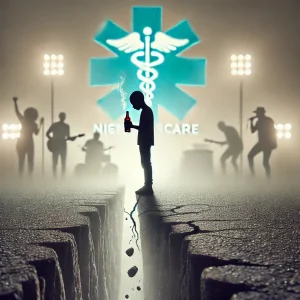Nigeria's youth are increasingly embracing a culture of drug and alcohol abuse, heavily influenced by creative scenes and pop stars as well as Western media that glamorize excess. Unlike countries with strong healthcare systems, Nigeria's healthcare is ill-equipped to handle the inevitable fallout. This dangerous trend threatens to create a generational crisis, with addiction and health complications spiralling out of control. Without urgent cultural shifts and systemic interventions, the consequences could be catastrophic. Read on to understand the risks and explore potential solutions to save our future.

Nigeria's youth are teetering on the edge of a dangerous trend that could lead to a national health crisis. The abuse of drugs and alcohol, once taboo and stigmatized, is now increasingly glamorized and normalized. Nigerian pop stars, social media influencers, and even beloved actors are at the forefront of this cultural shift, making it seem appealing and consequence-free. The allure of this lifestyle is powerful, promising excitement, status, and a break from the harsh realities of everyday life. But behind the glitter and glam lies a sobering truth: Nigeria's fragile healthcare system is nowhere near equipped to deal with the aftermath of this growing epidemic.
The Pop Culture Influence: More Than Just Entertainment
The entertainment industry holds immense sway over young minds, and in Nigeria, the influence of pop culture has never been more substantial. Musicians and celebrities, who are idolized by millions, have made substance use a hallmark of their public personas. Flashy music videos often feature scenes of alcohol-fueled parties, smoky rooms filled with cannabis haze, and a carefree, hedonistic lifestyle.
In the past, such open displays of excess were rare. Even Fela Kuti, the legendary Afrobeat pioneer known for his bold defiance and marijuana use, was an outlier in his time. Today, this image has shifted from the exception to the norm. Young artists frequently post videos of themselves smoking or surrounded by alcohol, sending a clear message that indulgence is synonymous with success and rebellion. What started as a way to rebel or shock has become mainstream, and impressionable youths are taking note.
The Western Influence: A Dangerous Aspiration
The fascination with Western culture has only intensified the problem. American and European celebrities are known for their lavish lifestyles, which are often characterized by heavy drinking and drug use. In movies, series, and even social media content, the narrative surrounding substance use is usually one of fun, freedom, and resilience. These portrayals make it easy to forget the harsh realities of addiction and its consequences.
Moreover, Western nations have healthcare systems that can cushion the blow when things go wrong. From advanced medical treatments for liver disease to comprehensive rehabilitation programs, these countries have built-in safety nets that Nigeria does not possess. The allure of living like Western stars seems irresistible to many young Nigerians, yet the repercussions in a country with inadequate healthcare infrastructure could be catastrophic.
Healthcare in Nigeria: A System Unprepared for the Fallout
Nigeria's healthcare system is hanging by a thread, barely capable of handling everyday medical emergencies, let alone the complex and chronic conditions associated with substance abuse. The public health sector is plagued with underfunding, a shortage of skilled professionals, and a lack of basic infrastructure. Addiction treatment centres are few and far between, and mental health services remain a luxury rather than a necessity.
Chronic illnesses like liver disease, respiratory problems, and mental health disorders linked to drug and alcohol abuse are often left untreated or mismanaged. Unlike in the West, where continuous care and rehabilitation are available, Nigerian addicts may never get the help they need. This gap exposes the youth, and the burden on families, already struggling to make ends meet, can be immense.
Life Without a Safety Net: A Generation at Risk
The psychological impact of substance abuse in Nigeria is deeply intertwined with the socio-economic challenges faced by the youth. In a country where opportunities are scarce, the escape that substances provide can become an unhealthy coping mechanism. For many, the high offers a brief reprieve from unemployment, poverty, and lack of prospects. But this temporary relief comes at a steep cost.
Without support systems to fall back on, addiction can spiral out of control. A young person who starts drinking or smoking to feel better is unlikely to find the resources to stop once they're hooked. Economic hardship can make it nearly impossible to seek help, and the longer the cycle continues, the more difficult it becomes to break. The result? A potential generational crisis that could have devastating ripple effects across the nation.
The Real Consequences: It Won't Stay Glamorous for Long
The consequences of substance abuse are real, and they are anything but glamorous. Liver damage from alcohol, lung disease from smoking, and the mental health decline associated with drug abuse can rob young people of their futures. The allure of a carefree lifestyle fades when health complications set in, and the support structures that could provide help are often nonexistent.
Statistics and case studies paint a grim picture. Rising cases of alcohol-induced liver disease, increasing mental health issues, and the growing prevalence of drug addiction are red flags that cannot be ignored. Beyond personal health, the implications are far-reaching, affecting productivity, national development, and life expectancy. Nigeria, a country already grappling with numerous socio-economic challenges, cannot afford to let this issue spiral out of control.
The Way Forward: Prevention and Awareness
Addressing this crisis will require a multi-faceted approach. Education is critical—young people need to understand the dangers of substance abuse and the long-term health consequences. Schools, communities, and religious organizations can be crucial in spreading awareness and fostering a culture of healthy living.
Government intervention is equally important. Stricter regulations on the portrayal of drugs and alcohol in media, coupled with policies that promote mental health and addiction recovery, could help curb the trend. Investments in public health infrastructure, especially addiction treatment and mental health support, are long overdue. The entertainment industry, too, has a responsibility to portray balanced and realistic narratives, showcasing not only the glamour but also the devastation of addiction.
We Can't Afford to Lose This Generation
The stakes are high, and the cost of inaction could be a lost generation. Nigeria's youth are its most valuable resource, and allowing a culture of substance abuse to take root would be a national tragedy. Urgent cultural and systemic changes are needed to steer the nation in a healthier direction. We owe it to the next generation to provide better opportunities, healthcare, and examples. It's time to act before the smoke clears and we find ourselves in the dark, with the damage already done.

A Rising Crisis Among Nigeria's Youth
Nigeria's youth are teetering on the edge of a dangerous trend that could lead to a national health crisis. The abuse of drugs and alcohol, once taboo and stigmatized, is now increasingly glamorized and normalized. Nigerian pop stars, social media influencers, and even beloved actors are at the forefront of this cultural shift, making it seem appealing and consequence-free. The allure of this lifestyle is powerful, promising excitement, status, and a break from the harsh realities of everyday life. But behind the glitter and glam lies a sobering truth: Nigeria's fragile healthcare system is nowhere near equipped to deal with the aftermath of this growing epidemic.
The Pop Culture Influence: More Than Just Entertainment
The entertainment industry holds immense sway over young minds, and in Nigeria, the influence of pop culture has never been more substantial. Musicians and celebrities, who are idolized by millions, have made substance use a hallmark of their public personas. Flashy music videos often feature scenes of alcohol-fueled parties, smoky rooms filled with cannabis haze, and a carefree, hedonistic lifestyle.
In the past, such open displays of excess were rare. Even Fela Kuti, the legendary Afrobeat pioneer known for his bold defiance and marijuana use, was an outlier in his time. Today, this image has shifted from the exception to the norm. Young artists frequently post videos of themselves smoking or surrounded by alcohol, sending a clear message that indulgence is synonymous with success and rebellion. What started as a way to rebel or shock has become mainstream, and impressionable youths are taking note.
The Western Influence: A Dangerous Aspiration
The fascination with Western culture has only intensified the problem. American and European celebrities are known for their lavish lifestyles, which are often characterized by heavy drinking and drug use. In movies, series, and even social media content, the narrative surrounding substance use is usually one of fun, freedom, and resilience. These portrayals make it easy to forget the harsh realities of addiction and its consequences.
Moreover, Western nations have healthcare systems that can cushion the blow when things go wrong. From advanced medical treatments for liver disease to comprehensive rehabilitation programs, these countries have built-in safety nets that Nigeria does not possess. The allure of living like Western stars seems irresistible to many young Nigerians, yet the repercussions in a country with inadequate healthcare infrastructure could be catastrophic.
Healthcare in Nigeria: A System Unprepared for the Fallout
Nigeria's healthcare system is hanging by a thread, barely capable of handling everyday medical emergencies, let alone the complex and chronic conditions associated with substance abuse. The public health sector is plagued with underfunding, a shortage of skilled professionals, and a lack of basic infrastructure. Addiction treatment centres are few and far between, and mental health services remain a luxury rather than a necessity.
Chronic illnesses like liver disease, respiratory problems, and mental health disorders linked to drug and alcohol abuse are often left untreated or mismanaged. Unlike in the West, where continuous care and rehabilitation are available, Nigerian addicts may never get the help they need. This gap exposes the youth, and the burden on families, already struggling to make ends meet, can be immense.
Life Without a Safety Net: A Generation at Risk
The psychological impact of substance abuse in Nigeria is deeply intertwined with the socio-economic challenges faced by the youth. In a country where opportunities are scarce, the escape that substances provide can become an unhealthy coping mechanism. For many, the high offers a brief reprieve from unemployment, poverty, and lack of prospects. But this temporary relief comes at a steep cost.
Without support systems to fall back on, addiction can spiral out of control. A young person who starts drinking or smoking to feel better is unlikely to find the resources to stop once they're hooked. Economic hardship can make it nearly impossible to seek help, and the longer the cycle continues, the more difficult it becomes to break. The result? A potential generational crisis that could have devastating ripple effects across the nation.
The Real Consequences: It Won't Stay Glamorous for Long
The consequences of substance abuse are real, and they are anything but glamorous. Liver damage from alcohol, lung disease from smoking, and the mental health decline associated with drug abuse can rob young people of their futures. The allure of a carefree lifestyle fades when health complications set in, and the support structures that could provide help are often nonexistent.
Statistics and case studies paint a grim picture. Rising cases of alcohol-induced liver disease, increasing mental health issues, and the growing prevalence of drug addiction are red flags that cannot be ignored. Beyond personal health, the implications are far-reaching, affecting productivity, national development, and life expectancy. Nigeria, a country already grappling with numerous socio-economic challenges, cannot afford to let this issue spiral out of control.
The Way Forward: Prevention and Awareness
Addressing this crisis will require a multi-faceted approach. Education is critical—young people need to understand the dangers of substance abuse and the long-term health consequences. Schools, communities, and religious organizations can be crucial in spreading awareness and fostering a culture of healthy living.
Government intervention is equally important. Stricter regulations on the portrayal of drugs and alcohol in media, coupled with policies that promote mental health and addiction recovery, could help curb the trend. Investments in public health infrastructure, especially addiction treatment and mental health support, are long overdue. The entertainment industry, too, has a responsibility to portray balanced and realistic narratives, showcasing not only the glamour but also the devastation of addiction.
We Can't Afford to Lose This Generation
The stakes are high, and the cost of inaction could be a lost generation. Nigeria's youth are its most valuable resource, and allowing a culture of substance abuse to take root would be a national tragedy. Urgent cultural and systemic changes are needed to steer the nation in a healthier direction. We owe it to the next generation to provide better opportunities, healthcare, and examples. It's time to act before the smoke clears and we find ourselves in the dark, with the damage already done.




